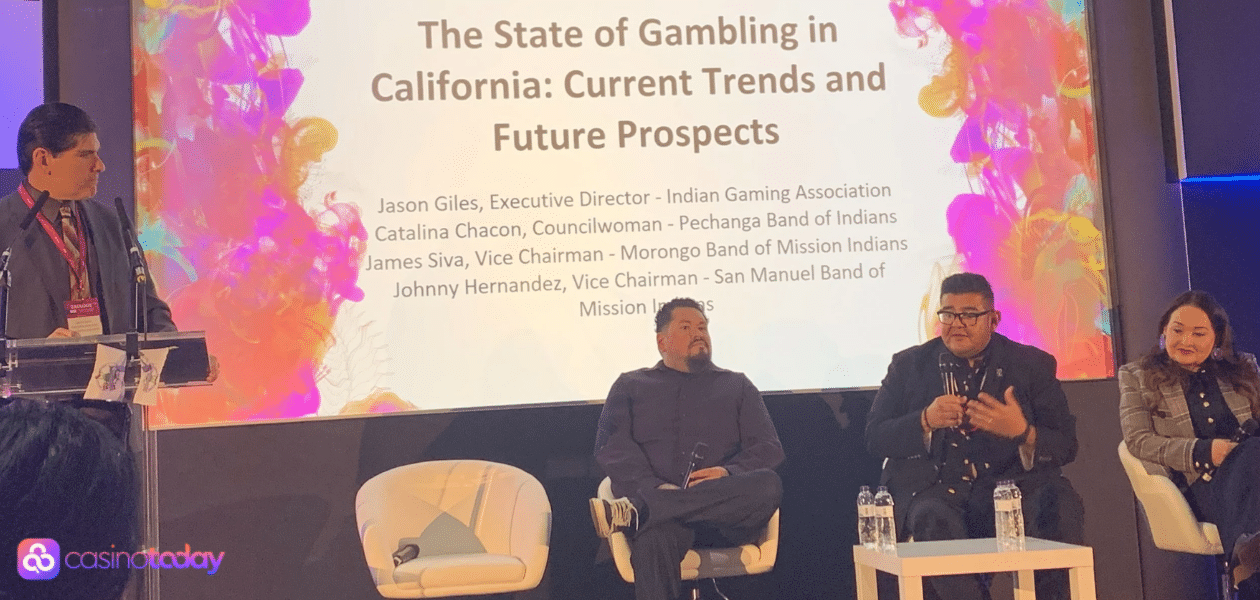Last updated: January 27, 2025

During a panel at ICE in Barcelona, leading California tribal representatives announced they will not pursue sports betting legislation on the 2026 ballot. Instead, they will focus on consensus-building among all tribes before possibly targeting 2028.
On 21st January, a panel of California tribal leaders informed ICE attendees that they wouldn’t place legal sports wagering on the 2026 ballot. Indian Country has come some way to a consensus but polling suggests voters are not interested.
California Nations Indian Gaming Association (CNIGA) chairman James Siva indicated that tribes have “come too far and have too far to go to rush into this complicated sports betting (matter) which is linked to igaming”. His comments triggered a chorus at the ‘State of Gambling in California: Current Trends and Future Prospects’ session at the ICE convention in Barcelona.
Siva was accompanied by San Manuel Band of Mission Indians vice chairman Johnny Hernandez and Pechanga Band of Mission Indians councilmember Catalina Chacon. The panel was the fourth of four hosted by the Indian Gaming Association (IGA). A guidebook on how to work with Indian Country, an overview of how San Manuel expanded gaming, and a discussion of future growth opportunities for tribal sports betting capped out the dialogue.
But the news was the tribes’ declaration that even though they felt pressure from the growth of sweepstakes, they would not seek another ballot measure so soon after having spent almost hundreds of millions to beat out a commercial proposal in 2022.
“It is not going to happen in 2026,” said Chacon. “The statistics are telling us that the timing is not quite right. Not 2026, certainly, we’re in the realm of 2028, but it would have to have all tribal California communities.”
Said Hernandez: “It has to involve all tribes, including the non-gaming tribes. I agree with Catalina that all the tribes must come to a consensus. Gaming has to come through the tribes.”
Persuading all of California Indian Country to be on the same page is no easy feat. There are over 100 tribes in the state. And they include the rich and famous as well as rural tribes that are barely able to access even the most rudimentary services. Pechanga and San Manuel were among the principal donors in the fight to pass Proposition 27 in 2022. Funded by seven commercial sports betting operators, Prop 27 would have legalized digital sports betting throughout California but the tribes fought it.
The tribal credo remains that any gaming expansion has to come from Indian Country. Tribes enjoy exclusivity in Class III gaming and they won’t be hurried.
We have come too far to rush into this to potentially hurt the foundation that we have established,” Siva said. “For 2026 we’re being very patient. The outlook is looking towards the future.
The somewhat behind-the-scenes news of the session is that tribes seem to have come at least close to top-line agreement. Chacon kept using the term “ownership” when discussing legalization. She said this means all tribes would have to sign up to a plan.
The language is a bit different than it was before when the term applied was “consensus”.
California tribes have what’s referred to as a Revenue Sharing Trust Fund (RSTF) where gaming tribes are presently contributing $1.1 million (£891,591/€1.05 million) annually to non-gaming tribes. The RSTF will undoubtedly be on the agenda with tribes when determining how they should divide the money once sports betting – and soon online casinos – becomes legal. The $1.1 million was last year’s figure from 1999 and, taking inflation and the shifting economy into consideration, it would appear reasonable to increase it.
The notion with the RSTF is that tribes that are not geographically situated to host land-based casinos can still receive some advantage from legal gaming. An online element could alter that.
In 2022, the tribes were targeting the legalization of in-person betting only while the commercial operators were considering online betting. None of the tribal chiefs clarified on Tuesday whether the follow-up initiative would be in-person only or include a digital aspect.
The sweepstakes resurgence remains a priority concern for California tribes. Moderator Jason Giles, Indian Gaming Association executive director, asked whether sweepstakes advertising is placing pressure on the tribes to legalize. Several sweepstakes operators, which are unregulated in California, are running advertisements on television and other media.
“They are getting away with it by claiming that it’s a non-play, that there isn’t any money,” Chacon said. “But if you strip back, you find that there is. It’s not OK. It’s illegal in California. Sweepstakes casinos are just not what they claim to be.”
IGA conference chairman Victor Rocha has been amazed at the increase in sweepstakes and last fall hosted a series of webinars on them. The illegal operators have acted to unite the legal sector and even provide tribes and commercial operators – themselves frequently at odds – with a common foe.
“It is a violation of both our exclusivity and infringing on our sovereignty,” Hernandez said of sweepstakes.